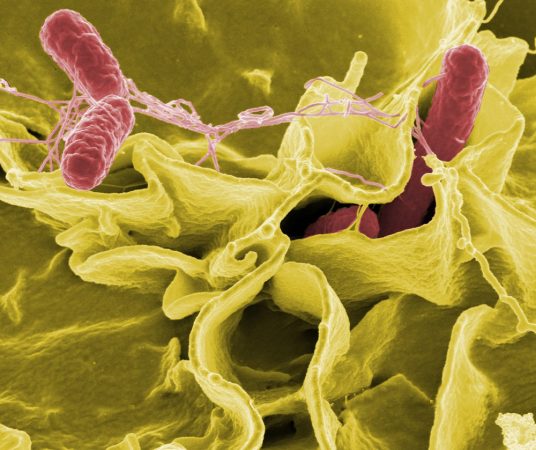Infection time
Disease is more severe when it hits in the morning, at least in mice
Share this:
- Share via email (Opens in new window) Email
- Click to share on Facebook (Opens in new window) Facebook
- Click to share on X (Opens in new window) X
- Click to share on Pinterest (Opens in new window) Pinterest
- Click to share on Reddit (Opens in new window) Reddit
- Share to Google Classroom (Opens in new window) Google Classroom
- Click to print (Opens in new window) Print

Salmonella is a germ to avoid: Some types of these bacteria can trigger food poisoning. But the severity of the illness may depend on what time — day or night — the infection took place, a new study in mice finds.
“This is the first study that has infected mammals with a [germ] and seen this effect,” Laura Roden told Science News. Roden, who did not work on the study, is a chronobiologist. These scientists study the natural rhythms, such as sleep and wake cycles, that occur throughout a 24-hour period. Such cycles are driven by the body’s internal timekeeper, known as a biological clock.
Roden has studied how time of day affects a plant’s response to infection. Other scientists have conducted similar studies in fruit flies. “We’ve gone from flies to plants, and now we have mammals,” says Roden, at the University of Cape Town in South Africa. The mouse study rounds out this research nicely, she says.
The brain behaves differently at different times of the day. Other organs do too. Previous studies have found that the body’s internal clock controls changes in hunger, sleepiness and the production of body chemicals throughout the day. These biological changes operate on a roughly 24-hour cycle and are known as circadian rhythms. The term comes from the Latin circa (for around) and dian (relating to a day).
Manuela Raffatellu and Paolo Sassone-Corsi at the University of California, Irvine, led the new study. The biologists wanted to know if that internal clock affects the body’s response to infection. To find out, they fed the mice liquid food tainted with Salmonella. Some were fed at 10 p.m., others at 10 a.m. Time of day indeed appeared to make a difference. Animals fed at night developed a milder Salmonella infection, the scientists found. They reported their results May 27 in the Proceedings of the National Academy of Sciences.
To assess the severity of the disease, the scientists dissected the guts of the mice. Some of the mice fed at night “looked like they had never been infected,” Raffatellu told Science News. Their guts showed no inflammation (or swelling and redness) that might be due to infection. But mice infected during the day often developed highly inflamed intestines. This meant their bodies had been fighting a serious gut infection.
If the new findings hold true for people, time of infection may also influence how we respond to germs. Mice are active at night. So the time they’re most at risk of infection may differ from that of people and other animals active mostly during the day.
Time of day also may be an important factor when giving vaccines.
Vaccines train the immune system to defend against some germs. That training may be more effective at some times of day than at others. So if the new findings hold for people, too, doctors might want to carefully time when they administer vaccines. That way these treatments can be as effective as possible, says Alec Davidson. A biologist at Morehouse School of Medicine in Atlanta, he did not work on the new study.
Power Words
pathogen A bacterium, virus or other particle that causes disease.
bacteria A large group of single-celled microorganisms, including some that can cause disease.
vaccine A substance used to stimulate the body’s immune system to provide immunity, or protection, against one or several diseases.
circadian Recurring naturally on a 24-hour cycle, even in the absence of fluctuations in light exposure.
inflammation The body’s response to cellular injury; often involves swelling, redness, heat and pain.







